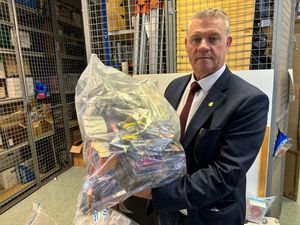Report reveals lies of crime scene officer
A scenes of crime officer called a woman's death a 'sad accident' and did not carry out a proper investigation - but months later her husband was convicted of murder.
Stephen Beattie lied about his qualifications and expertise and resigned from Staffordshire Police in 2011.
An official investigation was launched after he left - and now the catalogue of failings by the disgraced officer can be revealed.
In 2001 he was called to investigate the death of Kerry Goddard at her Cannock home. She was found with bruises on her neck and below a huge hole in the ceiling.
In his notes Beattie wrote: "'This appears to be a sad accident" and: "I am happy at this stage that this is an unfortunate accident within the home."
Her husband Stuart was later charged with her murder but claimed she died in a bondage session that went wrong. However he was found guilty in February 2002 at Stafford Crown Court.
The Independent Police Complaints Commission has looked into Beattie's career at the force and concluded that his work was 'poor' on a string of cases.
The report states: "The scene examination conducted by Mr Beattie which only included sketch plans, note taking and photographs, was not as extensive as that which would have been carried out if it had been recognised that it was a murder scene."
And the Detective Superintendent at the time told the inquiry: "I was and remain at a total loss as to how this scene, on the night, with the body of (Kerry Goddard) present could have been assessed as non-suspicious. I say this even taking into account the recent demands at the time on Mr Beattie and the potential for him to be tired."
Judge Chapman, on sentencing Goddard, even referred to Beattie's failings by saying: " It is plain that the first examination of the scene by the first forensic scientist was rather casual, and this case ultimately succeeded because of the care taken by the pathologist, Dr Tapp, and the forensic scientist whose name I think was Mr Whittaker. Without their skill and care the defendant might well have succeeded in passing this off as an accident, and I think it's right that their good work should be noted."
Goddard told detectives marks found on his schoolteacher wife's neck could have been caused by erotic-asphyxiation.
He said his blindfolded wife fell to her death through the floor of their loft during a sex game.
But Christopher Hotten QC said this explanation was untrue and aimed at covering up his attack on her at their five-bedroom home in Heath Hayes.
Mrs Goddard's body was found after she failed to pick up her children from a local childminder
Her husband was working at Gatwick Airport when he was informed of the death.
Instead of returning to Staffordshire, he withdrew £400 from a cash machine and drove to Scotland.
He was arrested driving his car on the M6 in Cumbria.
Post mortem tests showed some of the injuries on Mrs Goddard's body were caused by blunt force.
That was the highest profile case to be included in the IPCC probe. But it also reveals other instances where Beattie added his opinion to case notes and showed a lack of interest.
Comments included 'this appears to be a cry for help, the young man is lucky to be alive' following a suicide attempt, and 'possibly an inside job' in response to a burglary.
He also repeatedly noted that incidents of theft and criminal damage were a 'complete waste of my time'.
It is accepted that there were a number of 'missed opportunities' by Staffordshire Police in respect of the supervision of Beattie.
Beattie worked as a Scenes of Crime Officer for Staffordshire Police between 1996 and 2002 before taking up a role with Cleveland Police.
He told the force he was a level two fire investigator and a highly experienced officer.
IPCC Commissioner, Cindy Butts, said: "Stephen Beattie repeatedly lied about his qualifications and made judgements in cases that were both outside his remit and his level of expertise.
"Cleveland Police and Staffordshire Police have conducted meticulous investigations examining hundreds of cases and we know that, thankfully, his poor performance did not have a significant impact on the cases he was involved in."
John Beckwith, head of Staffordshire Police's Forensic Services, said: ""Staffordshire Police Forensics now operates within a quality standards framework and the department is accredited to international standards. This involves a vision of total quality management and continuous improvement. This focuses attention on any opportunities to improve the quality and integrity of the service to customers and the community.
"Nationally we lead the way in the introduction of quality standards in Digital Forensics and Streamlined Forensic Reporting and here again the emphasis is on ensuring all forensic practitioners are competent and fully conversant with their responsibilities to both integrity of evidence and the justice system.
"Even now there are always opportunities to learn and improve. Our initial findings from this report were shared with Forensic Managers and practitioners to support existing competence frameworks and development plans"




